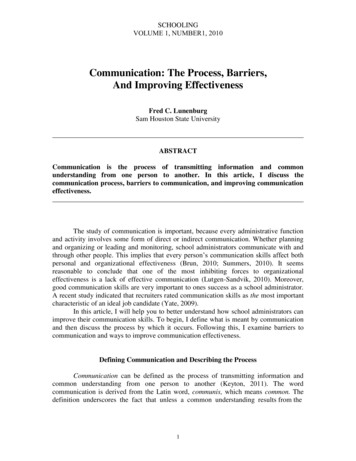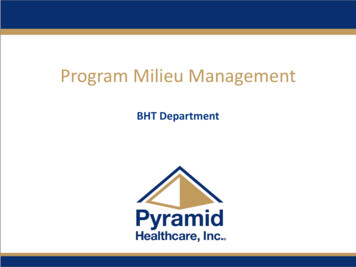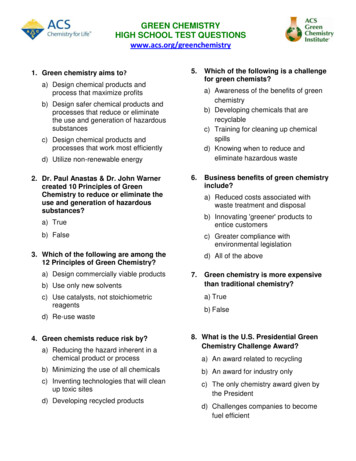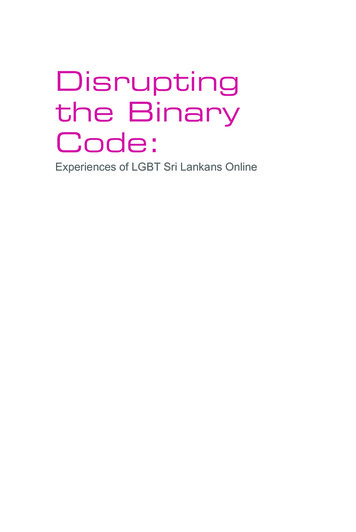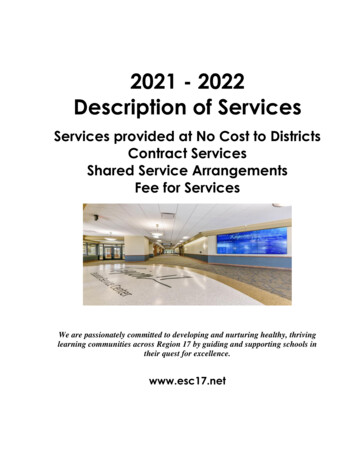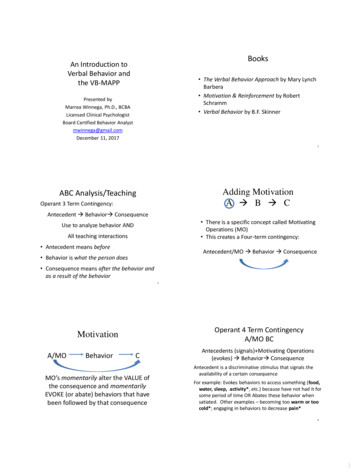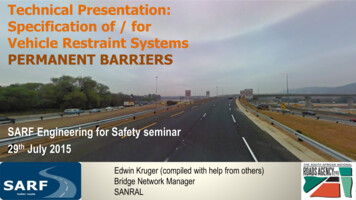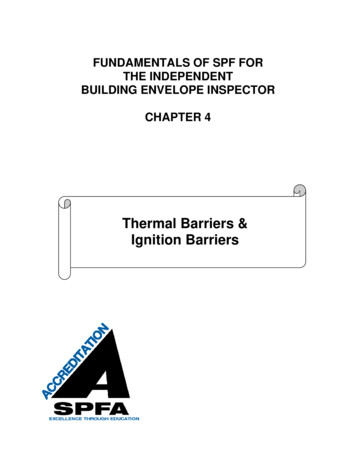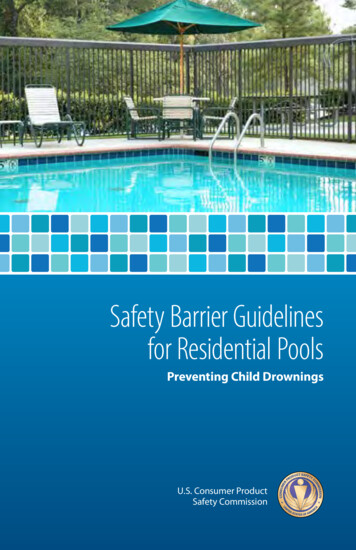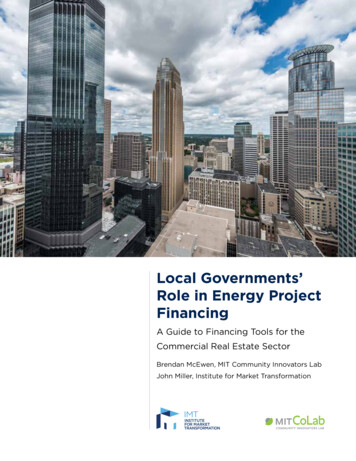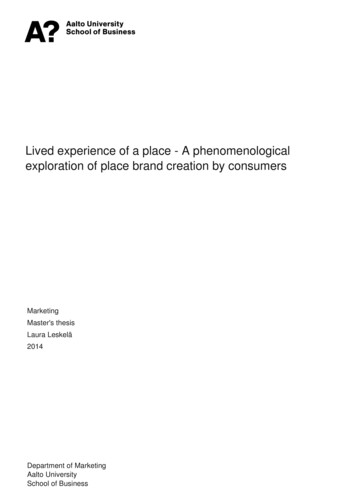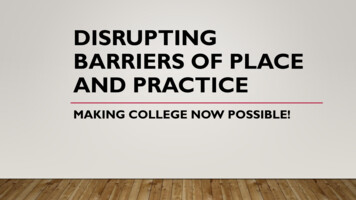
Transcription
DISRUPTINGBARRIERS OF PLACEAND PRACTICEMAKING COLLEGE NOW POSSIBLE!
YOUR PRESENTERS
DIANNE BARKERSecondary Initiatives State CoordinatorSecondary Education InitiativesOffice of Technical EducationTechnical College System of Georgia
TIM MELVINDual Enrollment CoordinatorGeorgia Cyber Academy
PATRICK (PAT) KEENEYDirectorNew Product Strategy (present focus: College Credit,CTE, STEM)MPS Product ManagementK12, Inc.
OUTLINE Introductions The Operational/Legislative Context in Georgia The GCA Story – DE in Action The Wider Network of Cyber Academy Possibilities Questions
GEORGIA’S OPERATIONAL CONTEXT
Move On When Ready!Program Goals Define and remove barriers to participation Expand opportunities for students Increase graduation rate and postsecondaryenrollment Build a workforce to fill highly skilled technical jobs Prepare students to succeed in a global economy
Dual Enrollment In GeorgiaAccelHOPE Grant DualCreditOld Move On WhenReadyThe NewMove On When Ready(MOWR)Dual EnrollmentProgram Simplify three programs into one program and funding source Expanded grade levels to include all 9th – 12th graders Expand course opportunities Full time or part time attendance Taken at the high school, college campus, or online
2015 Legislation(SB132) Move On When Ready ACT High school students may enroll in eligibleparticipating postsecondary institutions 9th – 12th grades Wide range of courses(SB 2) Alternate High School GraduationDiploma PathStudents complete at least the following state required highschool courses or their equivalent: 2 English2 math 2 science2 social studies 1 health and PE course All required EOC exams Free tuition and non course related fees Complete an associate degree, technical diploma or twocertificates in one specific career pathway that lead toindustry certification or license. Textbooks provided Awarded a high school diploma and college credential(s) Student’s pay for course fees/supplies
Funding State Appropriations: AY2016 30 mil set aside 22 mil added AY2017 60 mil set aside Colleges reimbursed: regular tuition costs up to 250 per credit hour 50 fees 25 per credit hour for textbooks
Eligibility Georgia public high schools Georgia private highschoolsGA Northwestern Tech student from FloydCounty High School in a GNTC Robotics andEngineering class. Home study programswithin the State of Georgiaoperated in accordancewith O.C.G.A. 20-2-690(c)
Eligible High School Students All students attending public or private highschools in Georgia or a home studyprogram operated in accordance withO.C.G.A. 20-2-690(c) Students classified as eligible by the highschool as 9th, 10th, 11th and 12th grades No residency requirement Meet admissions requirements atpostsecondary institutionWest GA Tech MOWR students from Heard CountyHigh School awarded cords for graduation!
MOWR Participation Agreement To participate, must submit a 4 year participationagreement to GSFC- Eligible postsecondary institutions- Georgia public high schools- Georgia private high schools- Home study programs operated inaccordance with O.C.G.A. 20-2-690(c) High School Counselor meets with students andparents to sign a student agreement form.MOWR students at Atlanta Tech visiting withcollege President, Dr. Alvetta Thomas
GEORGIA CYBER ACADEMY EXPERIENCE
GCA FAST FACTS State’s first and largest Virtual Public Charter School Opened in SY 2008 as k-6 / HS in SY 2011 /DE in SY 2013 Delivery model is 100% on-line Serving 15,000 students in grades k-12 / 5,500 in 9-12 From 159 counties 69% FRL Eligible 12.6% SPED www.gacyber.org
STUDENT PROFILE Scheduling Flexibility Disaffected/Marginalized Actors Bullied Athletes Special Needs Teen Parents Social Conservatives Working Teens P.O.P. – Prisoners of Policy Medically Fragile Gifted Under-Credited/Behind
MOTIVATION TO BEGIN DUAL ENROLLMENT Provide a richer array of academic offerings for our academichigh flyers Provide access to a meaningful menu of high quality CTEcourses/pathways Provide service that would/should be available in a B&M school
THE GCA APPROACH We are facilitators, not gatekeepers If the college thinks you’re ready, we do too If you can’t start local, start somewhere Crawl, walk, run It’s not where you start, its where you finish
AVAILABLE STATE COLLEGE SYSTEMSUSG Over 70 colleges statewide in thenetwork Vary by: Age/Grade level restrictions Testing requirementsTCSGPrivate Cohort/Non-cohort Application Deadlines
CHALLENGES AND OPPORTUNITIESTHE BARRIERSTHE OPPORTUNITIES Challenge 1 – No pre-existing partnerschool relationships Opportunity I - Free to make our ownpartnerships Challenge II – Statewide footprint Opportunity II - Access to all the schoolsin the network Challenge III – Varying interpretations ofstate policy Challenge IV – Limited Staffing Opportunity III – Partnering with covisionaries Opportunity IV – Unity of Vision andPurpose
VALUE ADDED FOR OUR COLLEGE PARTNERS Students who never have a HS scheduling conflict Students who are veteran virtual learners Students who are self-directed learners
CURRENT COLLEGE PLACEMENTS Abraham Baldwin Agricultural CollegeAlbany State UniversityArmstrong Atlantic State UniversityAthens Technical CollegeAtlanta Technical CollegeAugusta Technical CollegeCentral Georgia Technical CollegeChattahoochee Technical CollegeClayton State UniversityCoastal Pines Technical CollegeCollege of Coastal GeorgiaColumbus Technical CollegeDalton State CollegeEast Georgia State CollegeFort Valley State CollegeGeorgia College and State UniversityGeorgia Gwinnett CollegeGeorgia Highlands College Georgia Military CollegeGeorgia Northwestern Technical CollegeGeorgia Perimeter CollegeGeorgia Piedmont Technical CollegeGeorgia Regents UniversityGeorgia Southern UniversityGeorgia Southwestern State UniversityGeorgia State UniversityGwinnett Technical CollegeKennesaw State UniversityLanier Technical CollegeMiddle Georgia State CollegeOgeechee Technical CollegePoint UniversityReinhardt UniversitySavannah Technical CollegeSouth Georgia State CollegeSouth Georgia Technical College Southeastern Technical CollegeSouthern Crescent Technical CollegeSouthern Regional Technical CollegeToccoa Falls CollegeTruett-McConnell CollegeUniversity of North GeorgiaUniversity of West GeorgiaValdosta State UniversityWest Georgia Technical CollegeWiregrass Technical College
PROGRAM PARTICIPATION300250 SY 2013 – 20 students200150 SY 2017* - 265100500SY 2013SY 2014SY 2015Series 1SY 2016SY 2017*(sem 1)
COURSES TAKEN EACH YEAR180016001400 SY 2013 – 17312001000800 SY – 2017* - 16006004002000SY 2013SY 2014SY 2015Courses per yearSY 2016SY 2017*
THE OUTCOMES - STUDENT SUCCESS RATESSpring Fall2015 4Fall2014Pass 97%98%98%98%97%97%
THE WIDER NETWORK OF POSSIBILITIES
COMPANYCONFIDENTIAL28College Credit ProgramsOctober 2016
agree disagreeWhere students live should not dictateaccess to college credit programs.
Hope in the Next 10 -15 Minutes: Describe K12 network of schools Describe our present college credit programs, successes andopportunities
K12 Managed Public Schools Are Full-Time Public SchoolsServing Students in Grades K-12 Free to attend and typically open to students throughout the state Provide all of the support and services as traditional public schools Students are taught by highly qualified, state certified/licensed teachers Schools vary by size (student enrollment and teaching/administrative staff) Each school is led by an independent school board or school district which contracts with K12 to providecurriculum and other management services. K12 original public online schoolAvailable in 32 states & DCSome have blended componentTypically K – 12 Additional “targeted” support Access to social enrichment Available in over 10 states Scheduling/pacing flexibility Typically 7-12 or 9-12 Available in CA & MN Grades K – 12 Core curriculum PLUS CTE4-6 complete pathways/schoolAvailable in 6 statesPrep for industry credentials
Most K12 Managed Public Schools Offer High School High schools in 29 states 35k – 42k high school students
Year by Year More Students are Earning College CreditY/Y Performancen high school students 35k to 40kStudents Enrolled 2015-16: 3000160014001200100080060040020002013-14Courses Passed2014-152015-16: 6500400035003000250020001500100050002013-142014-15
57 Courses Taken by 28 of 127 Students in 11th and 12th Grades in 2014-15SYWYVA(one partnet)Image Design and Editing (1st sem)Digital Arts IDigital Arts IIWeb Design (1st sem)Computer Literacy (1st sem)Music Appreciation (full year)French III (1st sem)Spanish III (1st sem)AP Biology (full year)Pre- Calculus Trigonometry (1 sem)AP English (full year)
379 Total Tech Prep Concurrent EnrollmentCourses Taken in 2015-16 SYWAVA(one partner – EverettCommunity College)Computer LiteracyIntroduction to Entrepreneurship IWeb DesignImage Design and Editing
117 Students Took Concurrent Enrollment CoursesIDVA(multiple partners –Northwest Nazarene,College of So. Idaho, BoiseState)AP Lang & CompAP Lit & CompPre-CalculusTrigonometryAP CalculusChemistryAnat & PhysHonors Physics (1st sem)Honors Physics (2nd sem)Environmental ScienceAP History AAP History BSpanish III (1st sem)Spanish III (2nd sem)
Our Vision for Growth Highlights Concurrent Enrollment Approximately 4% of our high school students participate in college credit programs; goal over three years toincrease to 14% Aggressively grow concurrent enrollment opportunities for all willing schools– “Hot list”: CA, CO, WI, MI, OH– Align the quality of our courses to that required by any partner including Core courses CTE courses STEM/Tech courses Provide means for any student to access college credit programs
QUESTIONS?
PRESENTER CONTACT INFO: Dianne Barker dbarker@tcsg.edu Tim Melvin tmelvin@k12.com Pat Kenney pkeeney@k12.com
Point University Reinhardt University Savannah Technical College South Georgia State College South Georgia Technical College Southeastern Technical College Southern Crescent Technical College Southern Regional Technical College Toccoa Falls College Truett-McConnell College University of North Georgia
